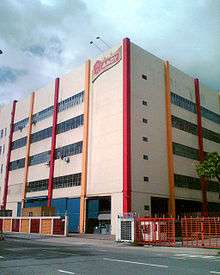Amoy Food
Amoy Food Limited is a manufacturer of cooking sauces and condiments in Hong Kong. Its products, which now include foodstuffs such as frozen foods and instant foods for heating in a microwave oven, are sold around the world. It was acquired in 2018 by CITIC Capital, a subsidiary of the CITIC Group.
 An Amoy plant, Tai Po Industrial Estate, Hong Kong | |||||||||||||
Native name | 淘化大同食品有限公司 | ||||||||||||
|---|---|---|---|---|---|---|---|---|---|---|---|---|---|
| Private company | |||||||||||||
| Industry | Food processing, Food industry | ||||||||||||
| Founded | 1908 | ||||||||||||
| Founder | 陳天恩 楊格非 | ||||||||||||
| Headquarters | 11-15 Dai Fu Street, Tai Po Industrial Estate, Tai Po, New Territories | ||||||||||||
| Products | Soy sauce, Frozen food | ||||||||||||
| Parent | CITIC Group | ||||||||||||
| Chinese name | |||||||||||||
| Traditional Chinese | 淘化大同 | ||||||||||||
| |||||||||||||
| Website | amoy | ||||||||||||
Its former factory site in Ngau Tau Kok was sold in the 1970s and has since been turned into an apartment complex called the Amoy Gardens. It was one of the hotzones of infection during the 2003 SARS Epidemic in Hong Kong.
Etymology
Amoy (廈門) is an English romanisation of the Min Nan pronunciation of the name of the city in Fujian province, China known in Mandarin as Xiamen.
History
In 1908, Tao Fa, the predecessor of the company, was founded in Xiamen for producing soy sauce and soy milk. In 1928, Amoy was set up in Hong Kong.
In a 1947 advertisement, the company was named as Amoy Canning Corporation, Ltd. (Chinese: 香港淘化大同公司; Cantonese Yale: Hēunggóng Tòufa Daaihtùng Gūngsī) with factory in Ngau Tau Kok and head office at Bonham Strand in Sheung Wan.
In 1977, Sime Darby group acquired 50% of Amoy Canning.[1]
In 1980, Hang Lung Development acquired 63% of Amoy Canning Corp. (HK) Ltd[2]
In 1983, fifty percent of Amoy Food was acquired by Pillsbury.[3]
In 1987, a manufacturing plant was set up in Tai Po Industrial Estate in Tai Po.
In 1988, it was reported to be the largest soy sauce maker in the area, producing 6,000 tonnes a year.[3]
In 1991, Amoy became wholly owned by the French dairy products company Danone.
On 12 January 2006, Danone sold the company to Ajinomoto of Japan.
In 2013, Amoy frozen food's factory in China was moved to Tai Po Industrial Estate in Hong Kong.
In 2018, Ajinomoto sold the company to CITIC Group of China.
References
- "Sime Darby & Co. Timeline:1910-2007" (PDF). Sime Darby. Archived from the original (PDF) on 11 October 2016. Retrieved 2 August 2016.
- "Corp. Milestones 1960-90". Hang Lung Group. Archived from the original on 6 August 2016. Retrieved 2 August 2016.
- Shurtleff, William; Aoyagi, Akiko. History of Soybeans and Soyfoods in Canada (1831–2010): Extensively Annotated Bibliography and Sourcebook.